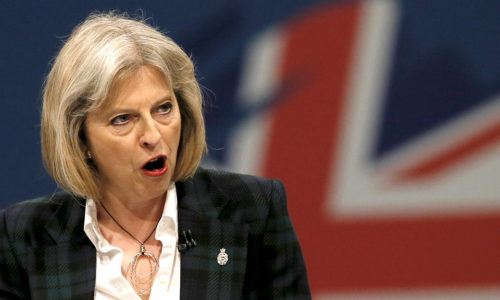
Theresa May promised to fight “burning injustice” in British society and create a union “between all of our citizens” as she sought to project a one-nation brand of Conservatism when she entered Downing Street for the first time as prime minister on Wednesday.
The radical change of direction at the heart of government was underlined by the sacking of George Osborne as chancellor, replacing David Cameron’s key lieutenant with former foreign secretary Philip Hammond.
Speaking after visiting the Queen in Buckingham Palace, May made a direct pitch for the political centre ground, promising to speak for the “ordinary working-class family” struggling to make ends meet. But while her language was centrist and conciliatory, May’s first cabinet appointments suggested a shift to the right, with Boris Johnson appointed as foreign secretary and veteran right-wingers David Davis and Liam Fox back in government as secretary for Brexit and international trade respectively.
Amber Rudd, the energy secretary, will succeed May as home secretary – a rapid rise for a woman who has only been in parliament since 2010, and joined the cabinet last May. Rudd cemented her reputation as a strong political performer during the televised referendum debates, in which she made a series of barbed comments about Johnson, who will now sit alongside her in the May cabinet.
The new prime minister said: “The government I lead will be driven not by the interests of the privileged few but by yours. We will do everything we can to give you more control over your lives.
“When we take the big calls, we’ll think not of the powerful, but you. When we pass new laws we’ll listen not to the mighty, but to you. When it comes to taxes we’ll prioritise not the wealthy but you.”
May’s first six cabinet appointments also demonstrated an attempt to reunite a Conservative party fractured by the EU referendum debate and tackle the tough task of negotiating Britain’s way out of the European Union.
Fox, the former defence secretary who resigned in disgrace in 2011, will return to government in the newly created post of international trade minister – a crucial role when Britain must renegotiate its trading relationships with the rest of the world in the wake of the Brexit vote.
Davis, another leading Vote Leave campaigner, will be the new secretary of state for exiting the European Union – likely to be known as Brexit secretary. Michael Fallon will stay at defence.
Speaking after his appointment as the new foreign secretary, Johnson told BBC News: “Obviously very, very humbled, very, very proud to be offered this chance. Clearly now we have a massive opportunity in this country to make a great success of our relationship with Europe and with the world and I’m very excited to be asked to play a part in that.”
Johnson’s job as foreign secretary is a more senior role than many in Westminster had expected after his last-minute decision not to stand as Tory leader. But with Davis negotiating the details of Brexit, and Fox in charge of international trade, the former mayor of London is likely to have a less sweeping role than his predecessors as foreign secretary.
May has repeatedly said since standing for her party’s leadership that “Brexit means Brexit”, but there are few clues as to how a new relationship with the other 27 EU member states will look.
END

Be the first to comment